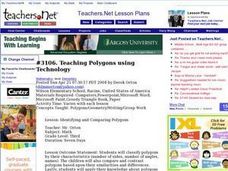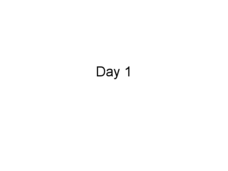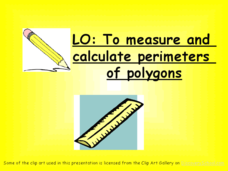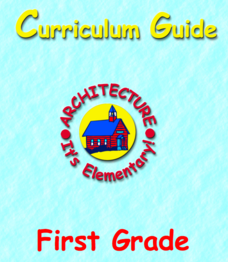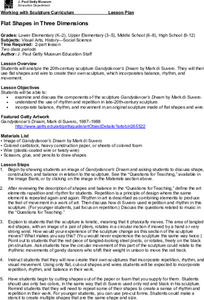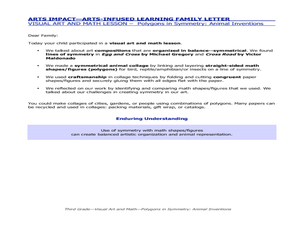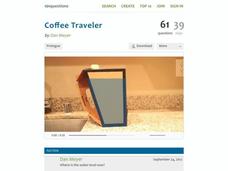Illustrative Mathematics
Finding Areas of Polygons, Variation 1
An exercise in finding the area of polygons by decomposing into triangles and composing into rectangles is the focus of this resource. Make several copies of the worksheet for each participant. Ask learners to use colored pencils to...
Curated OER
Classifying Three-Dimensional Shapes
Compare geometric solids based on their properties. Your emergent geometers use spaghetti and marshmallows to build models so they can examine the number of faces, edges, and vertices on polyhedra of their own creation. Resource includes...
Cold Spring Harbor Laboratory
The DNA Molecule Is Shaped like a Twisted Ladder
One of the first models of DNA appeared to be a triple helix. Young scientists learn about the many scientists who worked to find the shape of DNA. They observe multiple models, tests, and experiments to understand the conclusions. An...
Curated OER
Congruent Polygons: Copying Stretchy Shapes
Third graders investigate congruent polygons through dance. In this congruency lesson plan, 3rd graders do the "brain dance" as a warm up. They review polygon names by singing "The Polygon Chant," before mirroring congruent shapes with a...
K-5 Math Teaching Resources
Pattern Blocks
Who needs to buy pattern blocks when you have this printable pattern block template? Including triangles, squares, trapezoids, rhombuses, and hexagons, this resource offers endless possibilities for teaching children about geometric shapes.
Curated OER
Identify Shapes and Matching Parts
Students identify real world objects as shapes they have learned. In this 3-D shapes worksheet, students identify shapes such as a cube for a box, a sphere for a globe, and a cylinder for a soup can.
Curated OER
Shape of a Word Spelling
An interesting way to think about how to teach students to spell is presented here. The learners are instruced to look at the "shape" of the word they are trying to spell to see if it looks like the right one. The days of the week are...
Curated OER
Teaching Polygons using Technology
Third graders utilize different types of computer programs, such as Microsoft paint and Microsoft Word to study and create different types of polygons. They use PowerPoint to create a story about a shape and others that it meets during a...
Curated OER
Measures Combined
Use this resource to teach perimeter of regular plane shapes, measurement, rounding, and systematic problem solving skills. There are 78 complete slides and two game suggestions intended to facilitate content understanding.
Curated OER
Classifying Triangles Based On Properties of Angles
The interactive lesson featured here calls for the use of a Smartboard for sorting and classifying shapes. Then, pupils discuss the rules they followed for sorting their shapes, particularly focusing on the properties of angles. While...
Curated OER
Calculating and Measuring Perimeters of Polygons
If you're teaching 3rd or 4th grade math, this presentation is a must have. It defines perimeter and polygons, then describes the process by which perimeter is determined through pair share discussion and critical thinking questions....
Curated OER
Shapes
Discuss the properties of 2D and 3D shapes in order to help learners understand the concept. Learners will participate in an interactive whiteboard lesson to develop understanding of 2D and 3D shapes.
Curated OER
Obtuse Angles
Third graders recognize and identify geometric shapes, work with manipulatives to reinforce understanding, and create polygons with various angles to display their knowledge of the different types of angles.
Curated OER
Flat Shapes in Three Dimensions
Young scholars examine the 20th-century sculpture "Gandydancer's Dream" by Mark di Suvero. In this visual arts lesson, students examine the sculpture and then use flat shapes and wire to create their own sculpture. The young...
Mathed Up!
Nets, Plans, and Elevations
A dimensional resource teaches viewers to recognize 2-D views of 3-D objects and how to match nets with their 3-D figures. Individuals draw different views of three-dimensional objects including views from the front, side...
American Institute of Architects
Architecture: It's Elementary!—First Grade
Build an interest and appreciation for architecture in your young learners with this fun 10-lesson art unit. Engaging children in using their five senses, the class first observes the environment around them, paying...
Utah Education Network (UEN)
Create, Classify, and Sort Quadrilaterals
Quadrilaterals can be quirky! Fourth graders use geoboards and bands to create four-sided figures. They analyze the attributes such as angle size and presence of parallel sides. As a result they learn to differentiate among...
K12 Reader
The Art of M.C. Escher
Show your class one way in which art and math are related by teaching them about M.C. Escher. Class members read a brief passage and then respond to five related questions.
Curated OER
Dihedral Figures
Middle and high schoolers perform transformations. In this web based lesson, students explore dihedral figures. They use the web tools to translate, rotate, and reflect figures. Pupils identify lines of symmetry.
Curated OER
Flat Shapes in Three Dimension
Learners explore sculpture. In this lesson about finding sculpture ideas in movement and rhythm, students make 3-dimensional shapes. Learners create a sculpture paying attention to balance, rhythm and repetition. Students will understand...
Curated OER
Using Geometric Shapes To Make Patterns
Sixth graders explore the use of shapes to create geometric patterns. they start with a simple example of dividing shapes in half to create two new ones. This can be extended to creating intricate patterns.
Curated OER
Polygons in Symmetry: Animal Inventions
Fourth graders use polygons to create animal figures with symmetry. For this polygons and symmetry lesson, 4th graders create a symmetrical animal collage by cutting and gluing geometric shapes and figures from math activities.
Curated OER
Animal Masks
Learners create wonderfully animate animal masks out of balloons. They use the papier-mache technique to create three dimensional animal masks taking care to consider color, shape, texture, and the animals' features.
101 Questions
Coffee Traveler
Investigate the volume of irregular figures in an inquiry-based exercise. Presented with an irregularly shaped box filled with water, learners must predict the level of water when it is tipped on its side. The class can divide...







